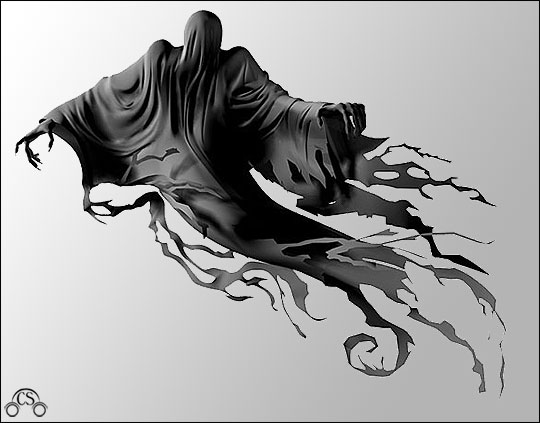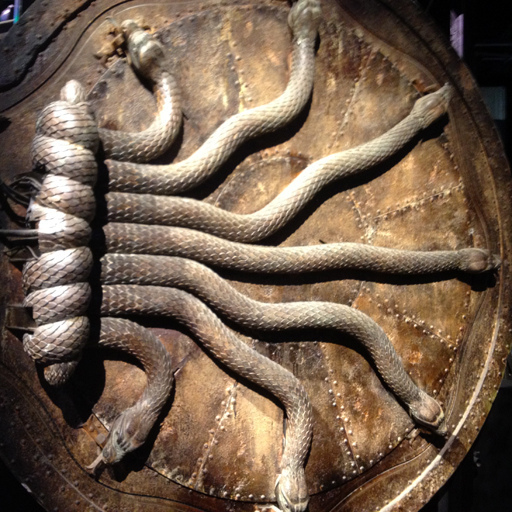[amazon_link id=”0439136369″ target=”_blank” ]Harry Potter and the Prisoner of Azkaban[/amazon_link] is such a great book. The movie based on it is my least favorite Harry Potter movie.
There are many reasons I love the book:
- Professor Lupin is awesome.
- Patronuses (Patroni?) are some seriously cool magic.
- Sirius Black is seriously scary as a villain.
- Divination is hilarious. Trelawney role is cut too much from the films compared to her role in the books.
- The Marauder’s Map is a seriously cool magical object.
- You get to learn a little bit more about Harry’s father and his friends for the first time in the series.
There are many reasons I don’t love the movie:
- Professor Lupin is not nearly as awesome. Not even close.
- Divination is given a short shrift. So is Care of Magical Creatures, but I didn’t care as much.
- The cuts are so extreme. So much of the James Potter and Co. backstory is deleted.
- Lupin as werewolf looks weird. Not like a scary werewolf.
There are more reasons.
In the first chapter, “Owl Post,” we find Harry in bed late at night writing an essay for History of Magic about witch burning. It’s an awesome little scene because it acknowledges real history and blends it with the wizarding world of the novels. He also gets his first ever birthday cards and presents. What a sad little scene, isn’t it? I mean, it makes you wonder why the Dursleys had to be that awful.
In the second chapter, “Aunt Marge’s Big Mistake,” perhaps one of the funniest events in the whole series takes place when Harry blows Aunt Marge up like a balloon. I do happen to think the movie handled that scene pretty well. What a horrible human being she is. You know, Pottermore says that part of Aunt Marge’s problem is that she harbors an unrequited love for her neighbor Col. Fubster (who is taking care of the dogs during her absence). Can you imagine how horrible it would be to have Marge Dursley in love with you? Gross. Anyway, according to Pottermore, a lot of her “nasty behavior” towards other people is down to the fact that Col. Fubster doesn’t return her feelings. However, interesting side note, the incident with Marge convinces the Dursleys that it’s not safe to invite Marge to visit when Harry is home, and so he never sees her again. That’s great news, isn’t it? For both of them, probably. J.K. Rowling has said that Lockhart was based on a real person, and I have a feeling that Marge is probably based on a particularly horrible person, too, though perhaps is a composite of a couple of horrible people. The description is too rich, if a little over the top. I love to hate her. I mean, for real—she gave Harry a box of dog biscuits? Who does that?
In chapter three, “The Knight Bus,” Harry is rescued in the form of yet another deus ex machina the Knight Bus. Lucky for him you have to stick out your wand arm and call it, right? How else would he get to London? Ah well, if Rowling relies on these kinds of devices, you can’t blame her too much. In a fantasy novel, they make more sense than in other types of fiction. Right before the bus shows up, Harry has run off and is wondering to himself why Ministry of Magic officials weren’t “swooping down on him where he sat.” Yeah. Why aren’t they? He has the Trace on him, according to Moody, until he’s 17. He should not be that hard to find. Apparition is instantaneous. How does he slip away before they can get there? At any rate, in case you are wondering why there might be a need for the Knight Bus, Pottermore says:
For witches and wizards who are Floo-sick, whose Apparition is unreliable, who hate heights or who feel frightened or queasy taking Portkeys, there is always the Knight Bus, which appears whenever a witch or wizard in urgent need of transportation sticks out their wand arm at the curb.
I do kind of love Stan Shunpike’s explanation when Harry asks “How come the Muggles don’t hear the bus?”
“Them!” said Stan contemptuously. “Don’ listen properly, do they? Don’ look properly either. Never notice nuffink, they don’.”
Incidentally, Rowling named the two Knight Bus conductors after her grandfathers, Ernest and Stanley.
Harry arrives at the Leaky Cauldron, more or less in one piece (I would never want to ride that bus myself) and runs smack into Cornelius Fudge, who doesn’t yet hate Harry. I do think it’s kind of funny when Fudge tells Harry that members of the Accidental Magic Reversal Squad went to Privet Drive and “punctured” Marge, then modified her memory… “So that’s that, and no harm done.” Harry is rightly skeptical about not being in trouble, and Fudge says, “We don’t send people to Azkaban just for flowing up their aunts!”
Chapter four, “The Leaky Cauldron,” deals with Harry’s last two weeks before returning to Hogwarts. I do like to read about Harry spending two weeks staying in Diagon Alley. It seems like such a grand adventure to be on your own in a place like that at the age of 13 for two weeks. I love the part where Harry does his essay at Florean Fortescue’s Ice Cream Parlor. There is a throwaway description of the sorts of people Harry sees at the Leaky Cauldron: “wild-looking warlocks, raucous dwarfs, and, once, what looked suspiciously like a hag, who ordered a plate of raw liver from behind a thick woolen balaclava.” So, though hags are mentioned several times in the series, we never really learn much about them. How are they demonstrably different from witches? Warlock seems to be either a special title given to some wizards or a particularly frightening looking wizard. Dwarfs are mentioned also as delivering singing Valentines in [amazon_link id=”0439064872″ target=”_blank” ]Harry Potter and the Chamber of Secrets[/amazon_link].
Harry runs into Ron and Hermione, who are staying at the Leaky Cauldron the night before leaving for Hogwarts. The trio discuss why Harry didn’t land in more trouble over the Aunt Marge incident, and Ron ascribes it to the fact that Harry is Harry Potter, after all:
“I’d hate to see what the Ministry’d do to me if I blew up an aunt. Mind you, they’d have to dig me up first, because Mum would’ve killed me.”
Hermione has three shopping bags of books, and the boys wonder why she is taking Muggle Studies when she’s Muggle-born, but she says, “It’ll be fascinating to study them from the wizarding point of view.” What does it say about me that I totally get what Hermione is saying here, and that I agree, it would be fascinating. Ron also gets a new wand, willow with a unicorn tail-hair. It seems that wands are long or short in proportion to their owners’ heights. Ron, being fairly tall, has a long wand at 14 inches. About willow wands, Pottermore says:
Willow is an uncommon wand wood with healing power, and I have noted that the ideal owner for a willow wand often has some (usually unwarranted) insecurity, however well they may try and hide it. While many confident customers insist on trying a willow wand (attracted by their handsome appearance and well-founded reputation for enabling advanced, non-verbal magic) my willow wands have consistently selected those of greatest potential, rather than those who feel they have little to learn. It has always been a proverb in my family that he who has furthest to travel will go fastest with willow.
Sounds like Ron, doesn’t it? Here is what Pottermore says about unicorn tail-hairs:
Unicorn hair generally produces the most consistent magic, and is least subject to fluctuations and blockages. Wands with unicorn cores are generally the most difficult to turn to the Dark Arts. They are the most faithful of all wands, and usually remain strongly attached to their first owner, irrespective of whether he or she was an accomplished witch or wizard.
Minor disadvantages of unicorn hair are that they do not make the most powerful wands (although the wand wood may compensate) and that they are prone to melancholy if seriously mishandled, meaning that the hair may ‘die’ and need replacing.
Of course, Ron’s first wand, Charlie’s old wand, also had a unicorn tail-hair. Interesting to note that Harry’s wand has a phoenix feather core, Ron’s has a unicorn tail-hair, and Hermione’s has dragon heartstring. The trio combined have wands made from the only three substances Ollivander uses as wand cores.
Then we meet Crookshanks. I can’t remember anymore where I read it, but Rowling has said that Crookshanks is part Kneazle, which is why he is particularly aggressive with Wormtail—Kneazles are great at ferreting out untrustworthy individuals. Incidentally, Mrs. Figg breeds Kneazles for a living, which is why she has so many cats.
Later on at dinner, there is a funny scene when Fred said that the Ministry cars would have little flags with HB on them—”for Humungous Bighead.” And right after that, “Everyone except Percy and Mrs. Weasley snorted into their pudding.” Which means that even Hermione, who normally disapproves of Percy-mocking, and Mr. Weasley (!) laughed at Fred’s joke. But Percy is a git, so I don’t blame them too much.
In chapter five, “The Dementor,” we meet not just Dementors, but also Professor Lupin. Lupin in the books is so cool. He is arguably the best teacher Harry has because Harry not only manages to learn a lot from him, but he also establishes a warm relationship with him, unlike the relationship he has with Snape. Lupin also gives excellent assessments (I’ll talk more about that later as we get to it). What is he doing on the Hogwarts Express, though? Is he there by Dumbledore’s request in order to look out for the students or Harry in particular? Surely he has no difficulty with apparition, and if he did, he could travel to Hogwarts by Floo Powder or some other means. There’s no reason for him to be on the train unless he’s meant to protect the students.
Several times in the book we learn the pocket Sneakoscope Ron gave Harry actually works pretty well. Ron mentions to Harry that it went off when Fred and George put beetles in Bill’s soup, though it also could have gone off because Wormtail was nearby. Then again, it went off in this chapter because of Wormtail. Ron says it also went off when he was tying it Errol’s leg. Errol is obviously not trustworthy, as he’s just about ready to keel over after every flight, but Hermione zeroes in on Ron’s behavior at the time instead, and Ron admits he was not supposed to be using Errol for long distances.
The Dementor boards the train and scares the crap out of everybody. I think they are possibly some of the creepiest things I’ve ever read about in any literature, and one of the things I like about them is that they can be felt by Muggles, who experience their presence as depression. Indeed, Rowling has said that depression inspired her creation of Dementors. She said she experienced depression as an “absence of being able to envisage that you will ever be cheerful again. The absence of hope. That very deadened feeling, which is so very different from feeling sad.” And I love the fact that chocolate does somewhat counteract the effects of Dementors. According to Pottermore:
The mood-enhancing properties of chocolate are well known in both the Muggle and wizard worlds. Chocolate is the perfect antidote for anyone who has been overcome in the presence of Dementors, which suck hope and happiness out of their surroundings. Chocolate can only be a short-term remedy, however. Finding ways to fight off Dementors—or depression—are essential if one is to become permanently happier. Excessive chocolate consumption cannot benefit either Muggle or wizard.
When announcing the new faculty at the feast, Dumbledore mentions that Professor Kettleburn, Care of Magical Creatures professor, is retiring to “enjoy more time with his remaining limbs.” Pottermore has more to share about Silvanus Kettleburn:
Kettleburn was an enthusiastic and occasionally reckless man whose great love of the often dangerous creatures he studied and looked after led to serious injuries to himself and, occasionally, others. This fact led to no fewer than sixty-two periods of probation during his time of employment at the school (a record that still stands). Like Hagrid after him, he was prone to underestimating the risks involved in caring for creatures such as Occamys, Grindylows and Fire Crabs, and once famously caused the Great Hall to catch fire after enchanting an Ashwinder to play the Worm in a play of “The Fountain of Fair Fortune.”
Kettleburn was a loveable if eccentric man and his continuing employment at the school was evidence of the great affection in which staff and students held him. He finished his career with only one arm and half a leg. Albus Dumbledore presented him with a full set of enchanted wooden limbs on his retirement, a gift that had to be replaced regularly since, because Kettleburn’s habit of visiting dragon sanctuaries in his spare time meant that his prosthetics were frequently set on fire.
Sounds a lot like Hagrid, doesn’t he? Kettleburn had been in Hufflepuff House as a student and had no wife and children.
Image via Harry Potter Wiki.



